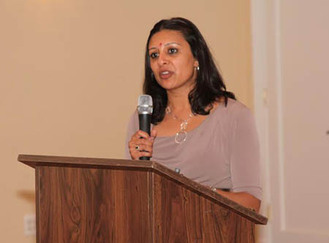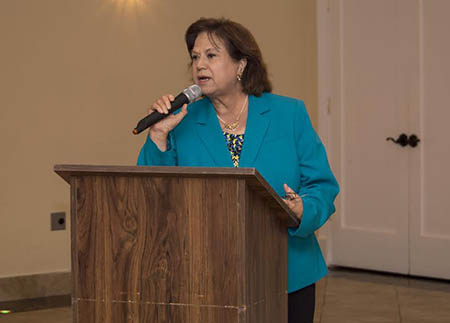
I.J.NEWS SERVICE
VIENNA, VA - The National Federation of Indian American Associations held its fourth annual conference on women, here and brought together a large number of policy makers, senior government officials and academicians to talk about programs related to education, business, professionals, health care and...
VIENNA, VA - The National Federation of Indian American Associations held its fourth annual conference on women, here and brought together a large number of policy makers, senior government officials and academicians to talk about programs related to education, business, professionals, health care and...
child care. The event, held on Sept.19 and spearheaded by NFIA Vice President Angela Anand, highlighted cooperation between India and the U.S. in many subject areas. The keynote speaker, Fatema Z. Sumar, Deputy Assistant Secretary of South and Central Asia, State Department, pointed out that women and girls are given a high priority by Obama administration. During her remarks, she explained, women and girls are at the center of America’s security strategy and foreign policy.
It is noteworthy; she said that the Secretary of State, John Kerry, has appointed six women assistant secretaries, including Nisha Biswal who heads the South and Central Asia Bureau. “I think it is a sign of bringing more women to the forefront”, she added.
Speaking on the bilateral relations between the two countries, Sumar told the audience, “We are very excited about launching the US-India Women Empowerment Dialog, led by US Ambassador at-large, Catherine Russell, for the global women issues in near future. “Already we have launched South Asian Women’s Network to connect women in those countries,” she noted.
Susan Markham, a senior coordinator of Gender Equality and an expert on women empowerment from USAID who had just returned from Cyprus remarked, “The equal participation of women in the political, economic and social systems of a society is essential to USAID’s mission to end extreme poverty and promote resilient, democratic societies while advancing our security and prosperity.” “USAID conducts a variety of programs in India to close the gap in access to resources, prevent gender based violence and empower women entrepreneurs as they seek to become decision makers in their own lives,” said Markham.
Raymond Vicroy, former Assistant Secretary of Commerce said, “There must be recognition in government, the private sector, and academia that women and girls are equal to men and boys in their rights to education and other spheres.”
Dr. Priya Basu, Manager of Development Finance at the World Bank, said very emphatically, equal and full participation of women and girls increases the prosperity and stability of societies. “We have made progress in the last 19 years since Beijing 1995 yet some 65 million girls are missing from classroom worldwide,” she pointed out.
Dr. Basu said, “For empowering women and for women to have a say in their reproductive rights, evils of domestic violence and gender-based violence, men and boys must be included in this conversation.”
The same words were echoed by Aruna Miller, Delegate from the 15th district of Maryland who quoted some alarming statistics: one in four women will experience violence in her life time; one in six will be raped. “Although women make up 51% of our population, they are still the 51% minority when it comes to their economics, reproductive, legal and political rights” said Miller.
Lisa Curtis, a Senior Coordinator on India Project of Heritage Foundation, shared her findings that women make up less than 30% of senior positions across foreign policy and the national security establishment.
The disparate treatment given to girls over boys was pointed out by actress, Jyoti Singh, who narrated incidence after incidence of girls expected to help with household chores after school, women getting beaten and abused by their spouses and loneliness experienced by victims of abuse. Three styles of dance from North & South India were presented at the conclusion.
It is noteworthy; she said that the Secretary of State, John Kerry, has appointed six women assistant secretaries, including Nisha Biswal who heads the South and Central Asia Bureau. “I think it is a sign of bringing more women to the forefront”, she added.
Speaking on the bilateral relations between the two countries, Sumar told the audience, “We are very excited about launching the US-India Women Empowerment Dialog, led by US Ambassador at-large, Catherine Russell, for the global women issues in near future. “Already we have launched South Asian Women’s Network to connect women in those countries,” she noted.
Susan Markham, a senior coordinator of Gender Equality and an expert on women empowerment from USAID who had just returned from Cyprus remarked, “The equal participation of women in the political, economic and social systems of a society is essential to USAID’s mission to end extreme poverty and promote resilient, democratic societies while advancing our security and prosperity.” “USAID conducts a variety of programs in India to close the gap in access to resources, prevent gender based violence and empower women entrepreneurs as they seek to become decision makers in their own lives,” said Markham.
Raymond Vicroy, former Assistant Secretary of Commerce said, “There must be recognition in government, the private sector, and academia that women and girls are equal to men and boys in their rights to education and other spheres.”
Dr. Priya Basu, Manager of Development Finance at the World Bank, said very emphatically, equal and full participation of women and girls increases the prosperity and stability of societies. “We have made progress in the last 19 years since Beijing 1995 yet some 65 million girls are missing from classroom worldwide,” she pointed out.
Dr. Basu said, “For empowering women and for women to have a say in their reproductive rights, evils of domestic violence and gender-based violence, men and boys must be included in this conversation.”
The same words were echoed by Aruna Miller, Delegate from the 15th district of Maryland who quoted some alarming statistics: one in four women will experience violence in her life time; one in six will be raped. “Although women make up 51% of our population, they are still the 51% minority when it comes to their economics, reproductive, legal and political rights” said Miller.
Lisa Curtis, a Senior Coordinator on India Project of Heritage Foundation, shared her findings that women make up less than 30% of senior positions across foreign policy and the national security establishment.
The disparate treatment given to girls over boys was pointed out by actress, Jyoti Singh, who narrated incidence after incidence of girls expected to help with household chores after school, women getting beaten and abused by their spouses and loneliness experienced by victims of abuse. Three styles of dance from North & South India were presented at the conclusion.




 RSS Feed
RSS Feed
